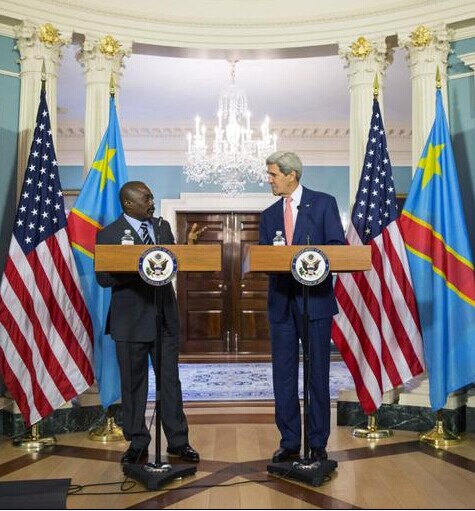Scholars not positive about U.S. promise to Africa
U.S.-Africa Leaders Summit concluded in Washington

U.S. news
U.S. Secretary of State John Kerry, right, was joined by President of the Democratic Republic of Congo Joseph Kabila, as they speak to media at the State Department in Washington on August 6 during the U.S.-Africa Leaders Summit.
On Aug. 6, the first U.S.-Africa Leaders Summit was convened in Washington, D.C. The summit is the largest event to be co-held by the United States and African heads of state and government. Many treaties were signed, covering the field of politics, economy and national security.
The United States pledged that it will invest a total of $34 billion in African infrastructure with an emphasis on electric power construction. The United States also repeated its commitment to put $110 million toward the goal of regional peace and security. At its core, the summit enabled discussion of concrete ideas to deepen the partnership between the United States and Africa and fostered stronger ties between the two.
As the first black president in American history, Obama stirred a wave of “America fever” on the continent when he was elected. African countries had high hopes for Obama. The son of a Kenyan father and an American mother, he was expected to enhance U.S.-African relations. However, the African people lost some of their initial enthusiasm for Obama after he showed insufficient attention to their countries.
With the expansion of its economy, Africa’s global strategic importance has also been on the rise. Statistics show that by the year 2035, Africa as a whole will be home to the world’s biggest working-age population. China, Japan and many European countries have established cooperative mechanisms with Africa with the aim of advancing partnerships in various sectors. However, the United States has for a long time neglected the development of Africa.
Francis Kornegay, senior research fellow from the Institute of Global Dialogue at the University of South Africa, summarized his view on U.S.-Africa relations. The situation Obama inherited from the Bush administration in the Middle East required him to give short shrift to Asia, Kornegay said. At the same time, Asian powers, including China, were becoming ever more important actors on the international stage, so Obama’s calculus prioritized Greater Asia, and as a result, Africa was relatively overlooked.
Steve McDonald, the former executive director of the U.S.-South Africa Leader Development Program at the Wilson Center remarked that in his first term, President Obama was overwhelmed with issues related to the global financial crisis, including bailing out the automotive industry and the banks.
He continued to say that Obama was also conscious of the need to be seen as a leader for all Americans and did not want to overemphasize his African roots. McDonald considered this a mistake, which seems to be the reason behind his timid approach to Africa.
Now Obama is in his last term, so he is less constrained by domestic politics and also aware of the recent progress made by Africa in terms of economic growth, changes of leadership in the Africa Union and growing stability in emerging democracies on the continent. All of these factors open up possibilities for policy initiatives that weren’t there a few years ago.
The United States needs to up its game on the continent, which now has many contenders for partnership—not just China but also India, Brazil, Japan and the European Union, Kornegay said. China is the biggest trade partner of Africa. Foreign policy experts should not make too much of the competitionion between the United States and China in Africa, though there is still much room for improvement, he said.
Talking about the challenges that the U.S.-Africa relationship faces, McDonald said that America needs to be seen as a willing and genuine partner by Africans for the long term, not just during the Obama years. There is still cynicism on the continent about U.S. motives since the establishment of U.S. Africa Command (AFRICOM) in 2007 as well as its more recent focus on security and the war on terror as rationales for deepening relations with Africa.
The good news is that more and more Africans are beginning to realize that the salvation of Africa will not come from outside or from the top but from within the continent and from below. Still, it will require responsible ownership and leadership to really achieve the much needed integration at the continental level. Only this integration will make a strong Africa capable of a true partnership with other world powers. Because hope is a shared value, many look forward to the day when Africa will stand on its own two feet and fully live up to its name as the cradle of humanity, concluded Ludovic Lado, a research fellow of the Africa Program at the Wilson Center.
The Chinese version appeared in Chinese Social Sciences Today, No.633, August 13, 2014.
Edited and Translated by Bai Le
The Chinese link:
http://intl.cssn.cn/hqxx/bwych/201408/t20140813_1289178.shtml
